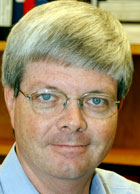Herbert W. “Skip” Virgin, M.D., Ph.D., has been named head of the Department of Pathology and Immunology at the School of Medicine.
Virgin came to the department in 1990 as an instructor and became a professor in 2002. As the new department head, he becomes the Edward Mallinckrodt Professor of Pathology and Immunology. He succeeds Emil R. Unanue, M.D., who served as head of the department for 21 years.

Larry J. Shapiro, M.D., executive vice chancellor and dean of the School of Medicine, made the announcement.
“Under Emil Unanue’s leadership, the Department of Pathology and Immunology has become a world leader in its field, with citation rates for its papers among the highest of all departments at the School of Medicine,” Shapiro said. “We are very much looking forward to seeing that tradition continue and expand under the guidance of Skip Virgin.”
Virgin’s goals include promoting departmental efforts to harness genetic information as a diagnostic tool, a core component of the University’s BioMed 21 initiative.
“Our faculty are an amazing group, with the brilliance, energy and drive to transform how we think about disease in a way that significantly benefits the patients we serve and the students we mentor,” Virgin said. “It is a great honor to be asked to serve as head of this historic and very distinguished department.”
The department is widely recognized for pioneering work in immunobiology, the study of how basic genetic and molecular mechanisms in the immune system defend against invaders and malfunction in autoimmune conditions like multiple sclerosis and rheumatoid arthritis.
Virgin’s research includes studies of how the immune system responds to chronic viral infections.
In 2004, Virgin’s group became the first to successfully grow noroviruses in the laboratory. Norovirus disease is characterized by frequent vomiting and diarrhea over the course of 1-2 days. The accomplishment is helping scientists seek ways to weaken norovirus for use as a vaccine.
Virgin earned medical and doctoral degrees at Harvard University Medical School in 1985.
Prior to coming to Washington University, he completed a residency in internal medicine at Brigham and Women’s Hospital and a postdoctoral fellowship in microbiology and molecular genetics at Harvard.
Virgin became a fellow of the American Association for the Advancement of Science in 2004 and a member of the American Society for Clinical Investigation in 1998. He received the School of Medicine’s Outstanding Faculty Mentor Award in 2002 and the Academic Mentorship Award of the Academic Women’s Network of Washington University in 2001.